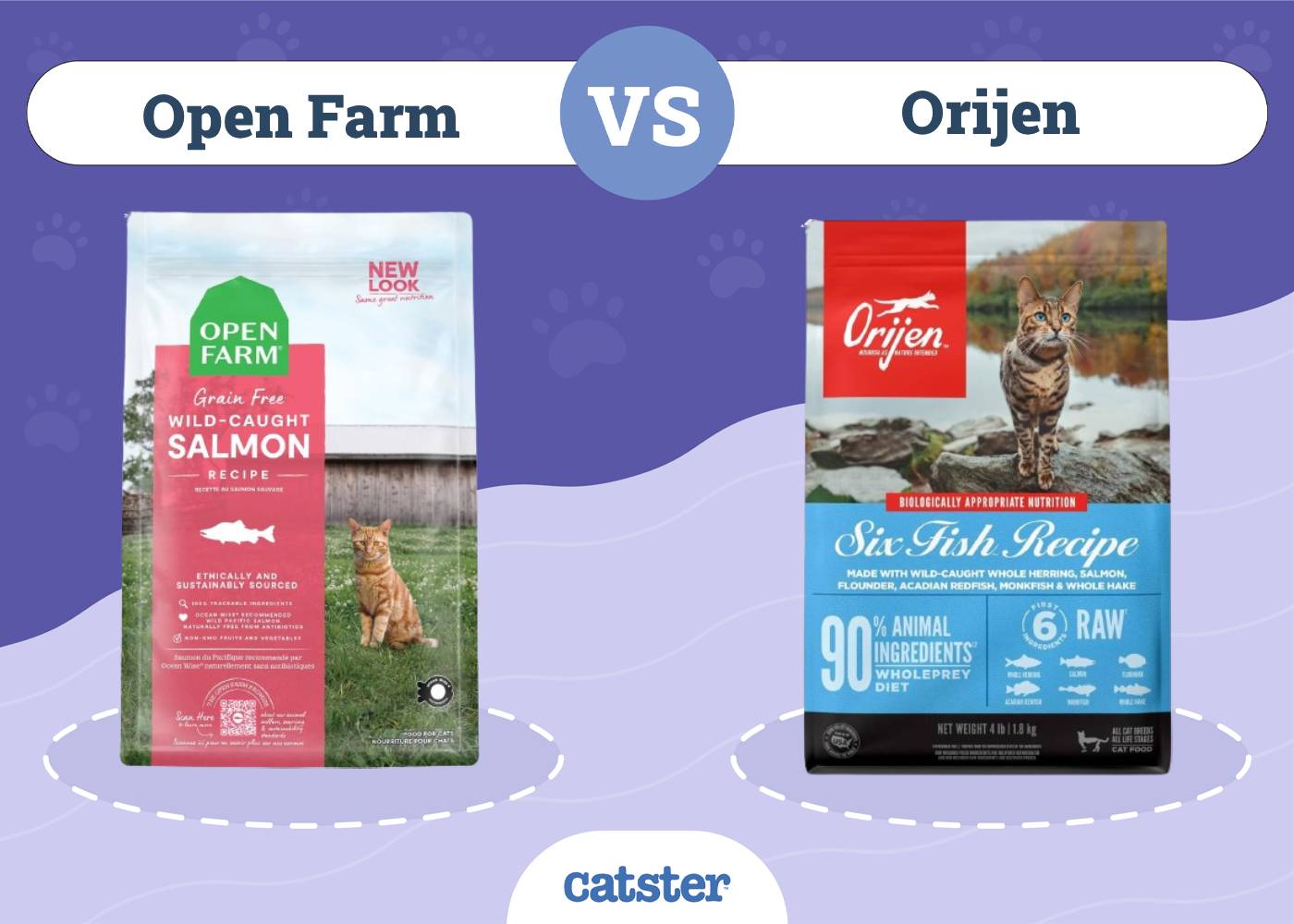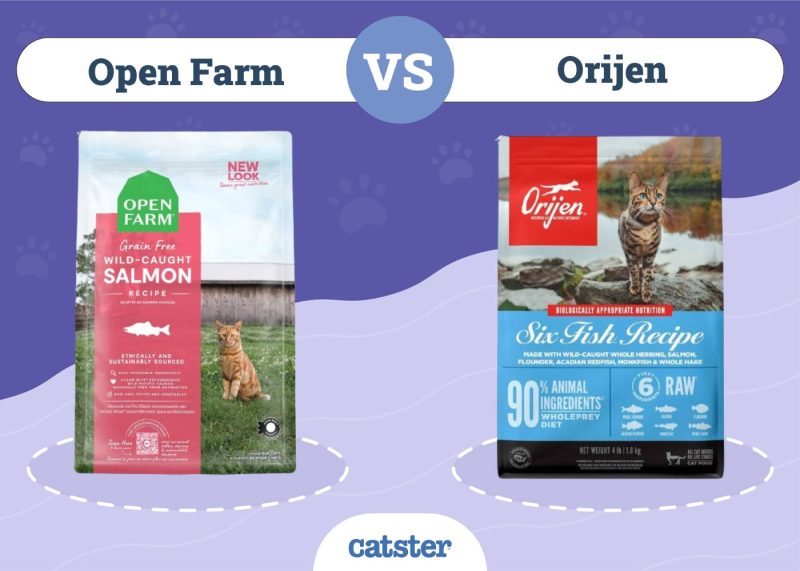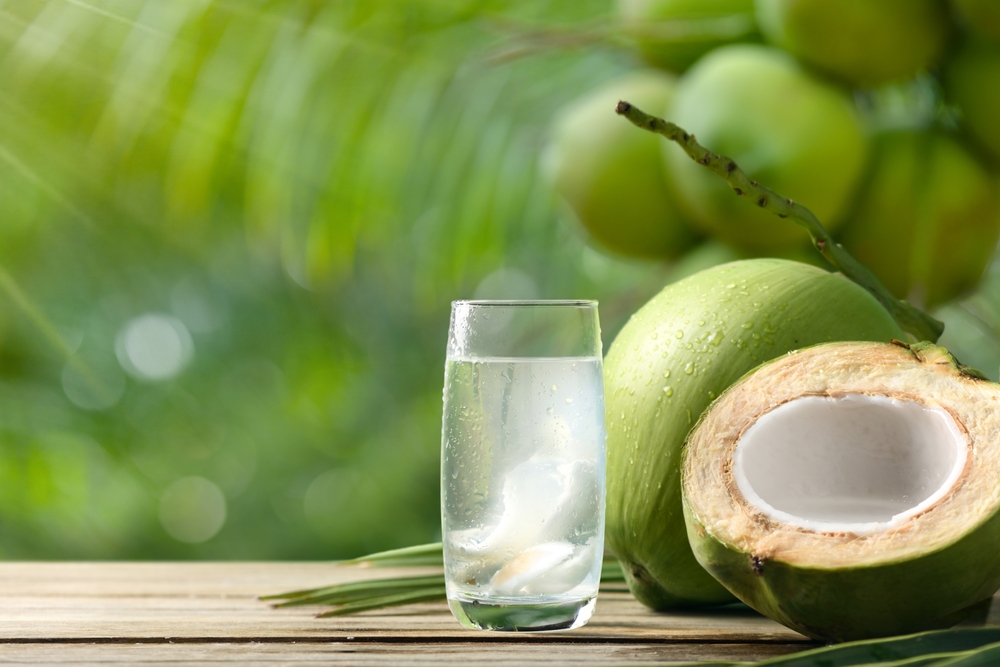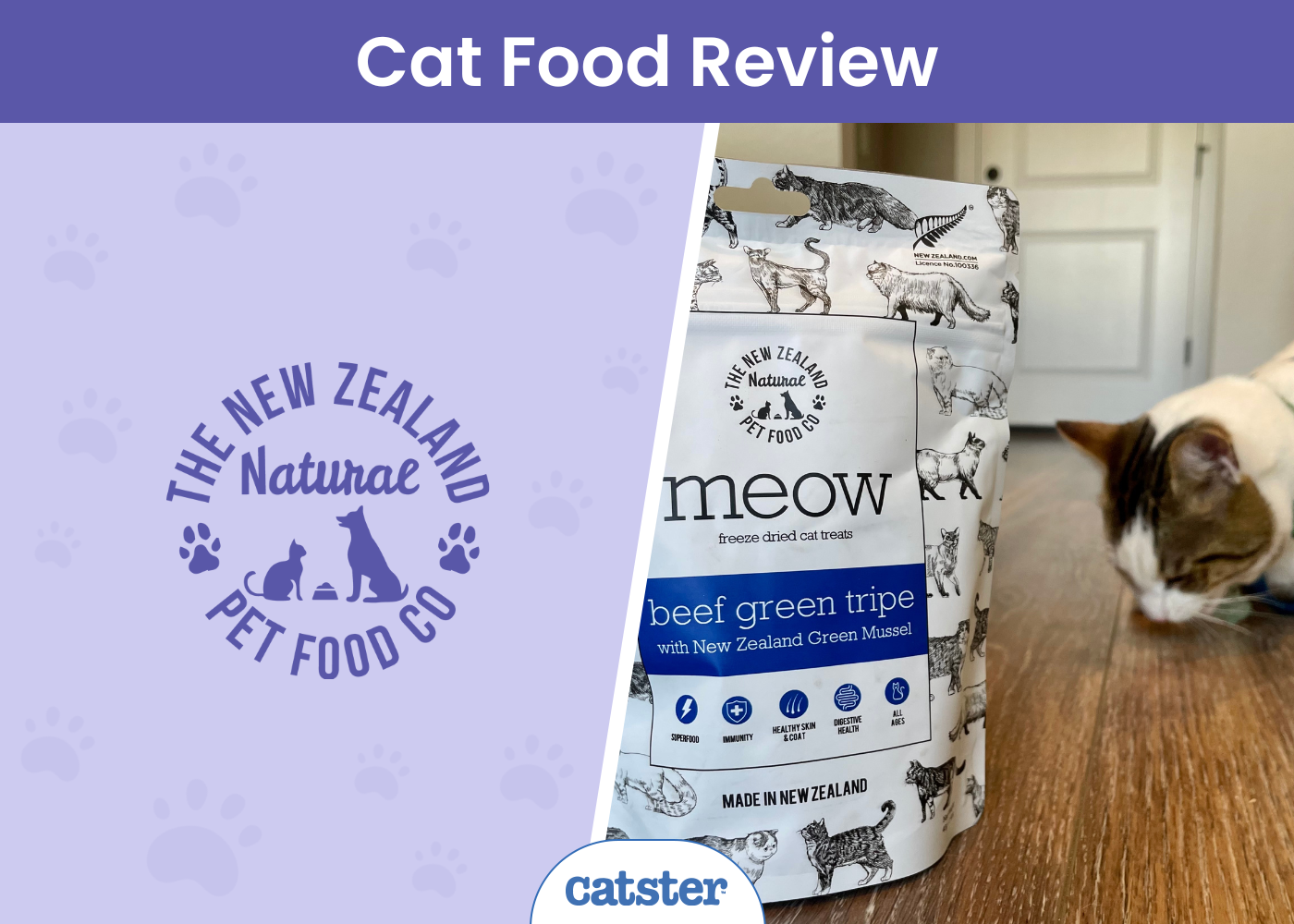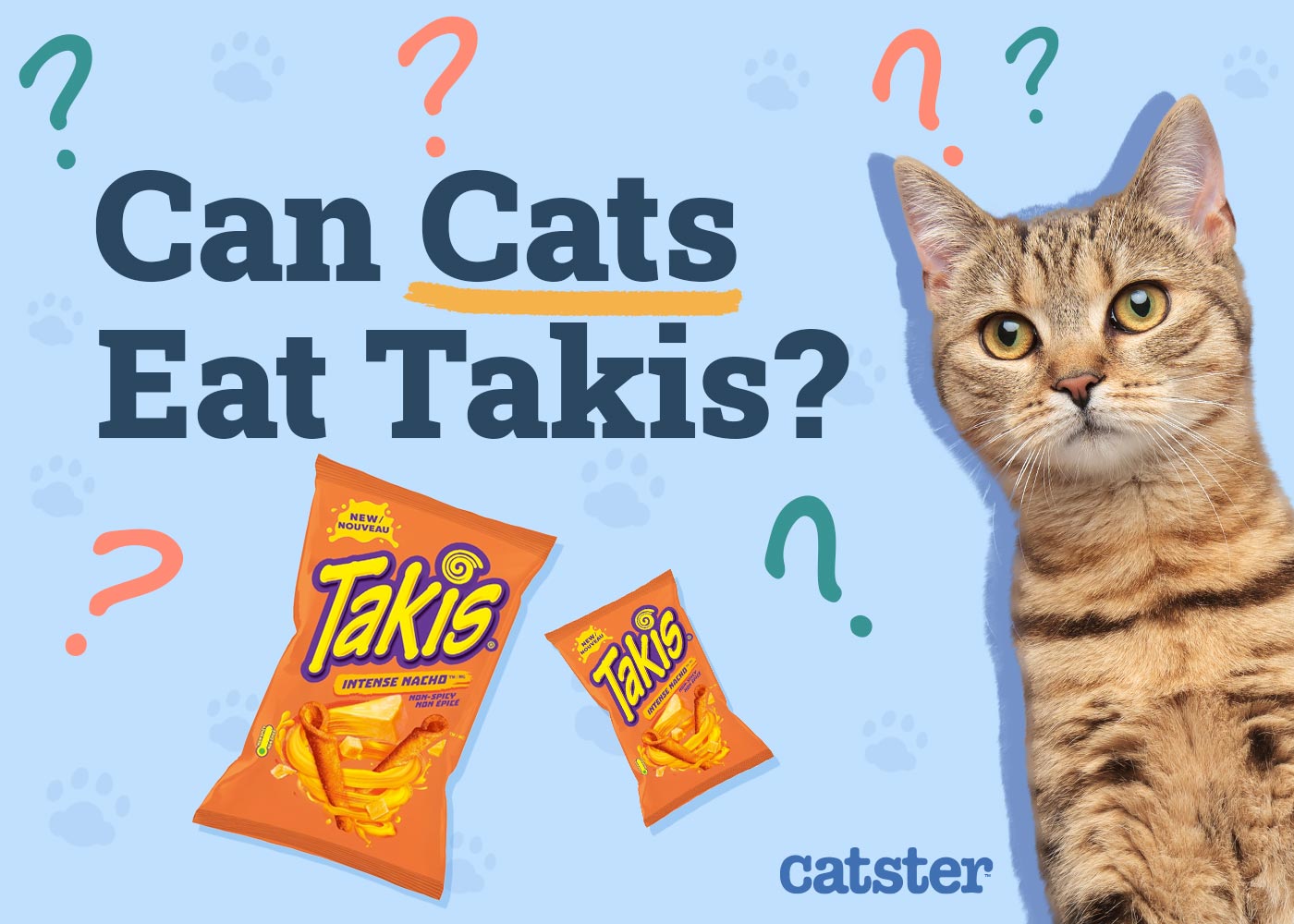What we feed our cats is important, but we all have different ideas of what is important in cat food. For example, the cat food brand Open Farm uses ethically sourced ingredients you can trace back to the source, while the Orijen brand has a higher meat content to imitate a feline’s natural diet. Both are very different, but the brands are surprisingly similar in certain areas.
Both brands fall into a mid-point price range and offer your pet plenty of protein in their diet, and both are quite popular with cat parents. Below, we’ll take a closer look at what makes these brands comparable and how they differ. Whether it’s taste, quality of ingredients, price, or customer reviews, we’ll see how they stack up. With this knowledge, you can decide which brand is better to feed your cat.

A Quick Comparison
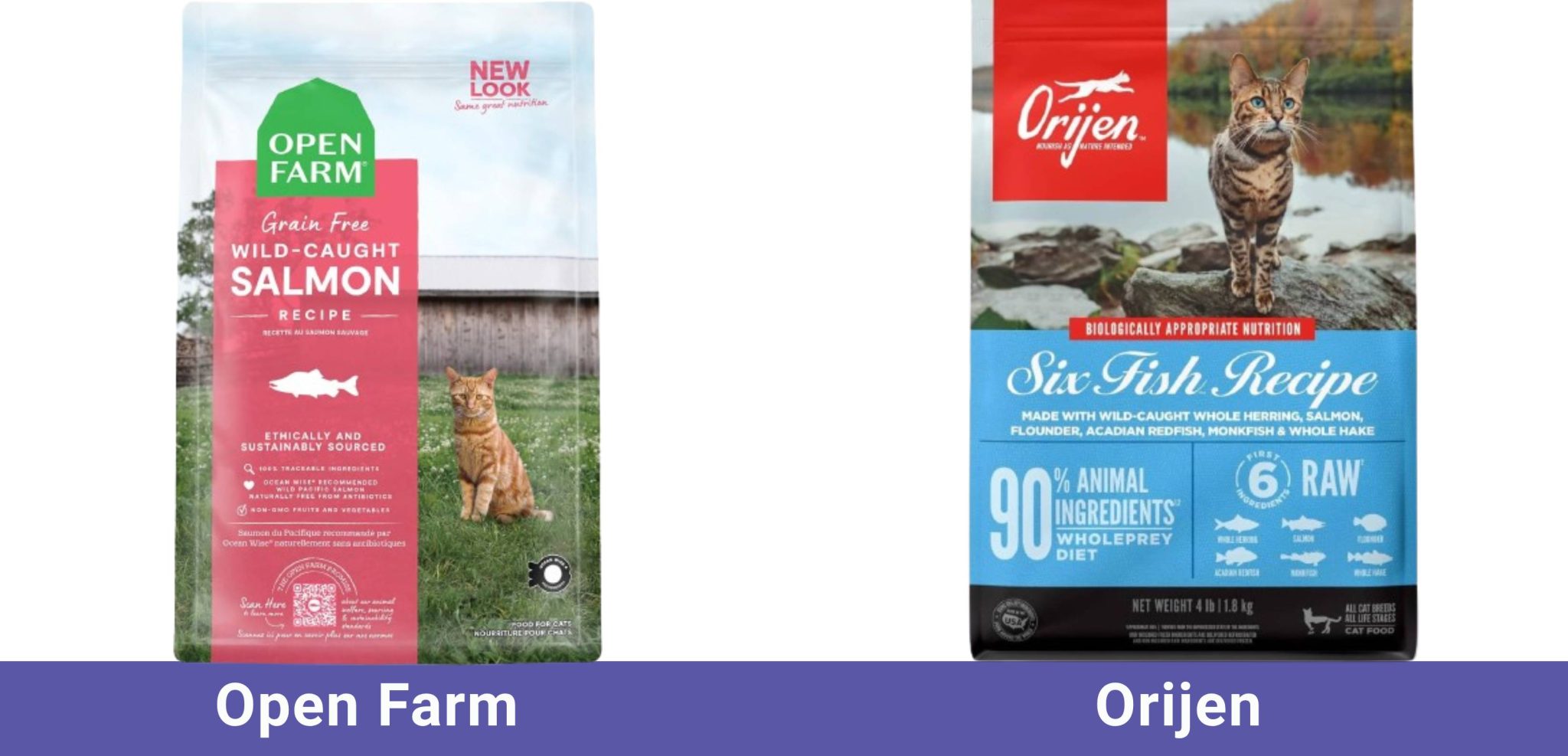
| Brand name | Open Farm | Orijen |
| Established | 2014 | 1985 |
| Product lines | Dry, wet, broths & supplements | Dry, wet & freeze-dried treats |
Brief History of Open Farm
Open Farm is a newer pet food company that was created in 2014. The co-founders—Jacqueline Prehogan, her husband Isaac Langleben, and her brother-in-law Derek Beigleman—decided to open the company after they had trouble finding natural, high-quality, nutritious pet food. It took a few years of hard work and research, but finally, Open Farm was opened.
The company aims to source the best ingredients from farmers who treat their livestock humanely while maintaining transparency and honesty with their customers. Open Farm ensures you can trace every ingredient back to its ethically sourced origins.
Brief History of Orijen
Orijen markets itself as a new type of cat food created to feed and nourish our feline friends with an evolutionary diet based on fresh meat and plenty of protein. The company was created in 1985 by Reinhard Mühlenfeld, a Canadian entrepreneur who dreamed of becoming the first Canadian pet food manufacturer.
The company began with only Reinhard himself and two employees who worked to make food for the animals of local farmers in Alberta. Thirty-three years later, Orijen had 500+ employees, a global sales team, and manufacturing facilities in Alberta, Ontario, and Kentucky.
Orijen was the original brand of Champion Petfoods, which was the first Canadian pet food manufacturer.
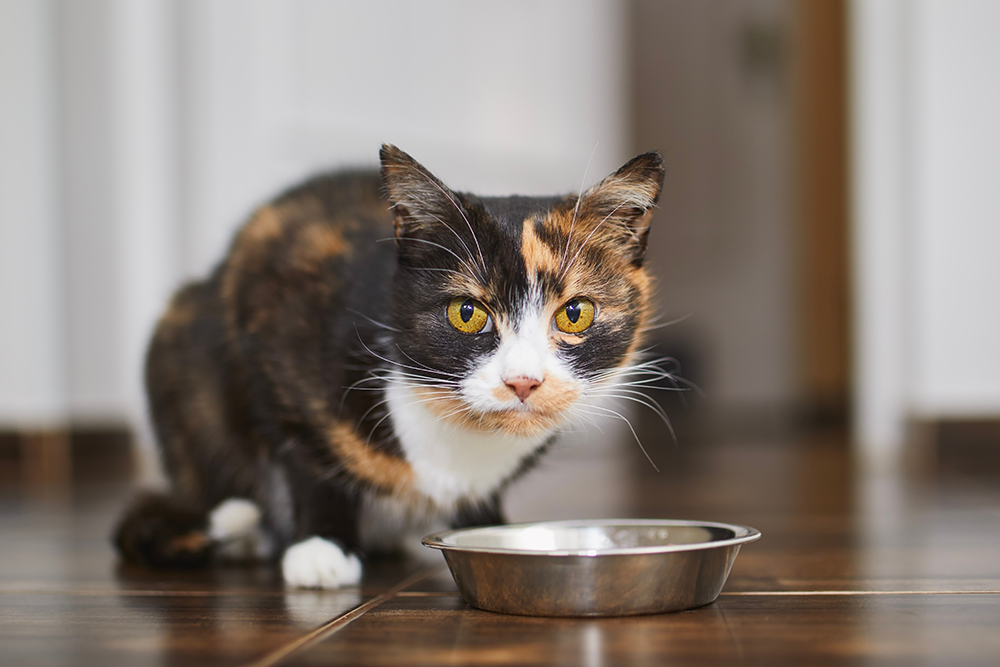

Open Farm Manufacturing
Though Open Farm is a Canadian company based in Toronto, the company’s manufacturing facilities are located in Minnesota. That includes everything related to the formulas, development, and distribution of Open Farm recipes in Canada. However, the facility in Minnesota manufactures everything and has access to Open Farm’s partner farms. The manufacturing facility also facilitates the company’s local veggie program.
This is why Open Farms packaging contains the phrases “Formulated in Canada” and “Made in the USA.” The Open Farm facility in Minnesota is routinely audited by the FDA, USDA, Certified Humane, and AIB International to ensure the highest food safety standards are consistently maintained. Every batch of Open Farm products is independently tested by a third-party lab.
Orijen Manufacturing
Champion Pet Foods owns and manufactures Orijen (as well as the Acana brand). Since Champion is based out of Canada, Orijen products were made exclusively in Alberta for quite a while. However, that changed in 2016 when Champion opened a manufacturing facility in Kentucky. The Orijen Canadian line is still produced in Alberta, while the U.S. line is made at the Kentucky facility.
Interesting fact: the U.S. and Canadian product lines contain slight differences because particular ingredients will be locally available at one manufacturing facility but not the other. These differences aren’t significant, but all of Orijen’s pet food products focus on high food safety standards and nutritional integrity.

Open Farm Product Line
Open Farm is a newer company that started with dog food before moving into cat food, so it’s still a bit limited in what it offers. However, with ethically sourced ingredients and high standards for quality control, Open Farm’s formulas, supplements, and mixers are nutritious options.
Dry Food
Open Farm’s dry food cat food line consists of four recipes:
- Homestead Turkey & Chicken
- Wild-Caught Salmon
- Catch-of-the-Season Whitefish
- Pasture-Raised Lamb
All recipes contain humanely raised meat or wild-caught fish from the North Pacific Ocean as the first ingredient, followed by fish meal as the second (and sometimes third) ingredient. Other ingredients include non-GMO fruits and veggies such as cranberries and chickpeas, other fruits and veggies such as apples and pumpkin, coconut and salmon oil, and greens such as dandelion greens.
Each product page on their site comes with a list of every ingredient, along with a description of each and where exactly it was sourced.
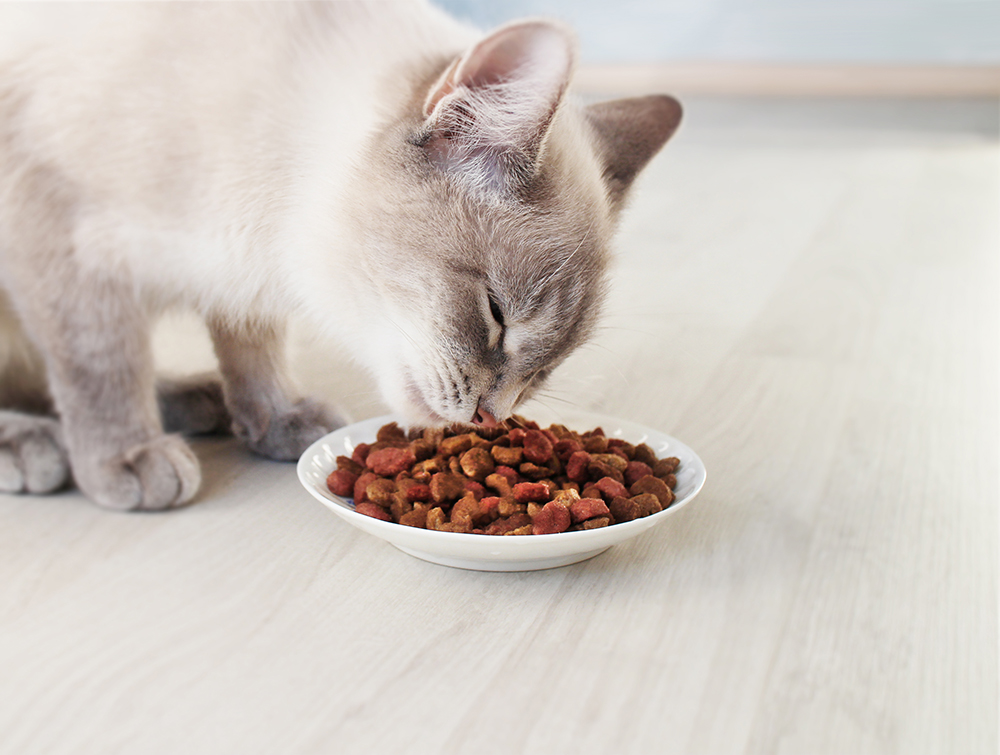
Wet Food
The Open Farm wet cat food line consists of six recipes:
- Harvest Chicken Rustic Blend
- Homestead Turkey Rustic Blend
- Wild-Caught Salmon Rustic Blend
- Chicken & Salmon Rustic Blend
- Grass-Fed Beef Rustic Blend
- Herring & Mackerel Rustic Blend
As with the dry food, each recipe contains either humanely raised meat or wild-caught fish as the first ingredient, except in this case, it’s human-grade meat. The rest of the ingredients in the wet food line consist of a mix of non-GMO veggies and fruits, regular veggies and fruits, along with coconut and salmon oil.
Whole ingredients are used for the wet food line, and each recipe is high in protein due to the meat content. And like the dry food, each product comes with a list of ingredients telling you where each came from.
Broths & Supplements
Open Farm also offers our feline friends an interesting selection of bone broths and supplements.
The bone broths come in:
- Harvest Chicken
- Homestead Turkey
- Grass-Fed Beef
Why bone broth? You can add it to your cat’s food for a collagen boost that will keep skin and coat healthy; plus, it’s a way to add moisture if your pet has trouble with dry foods.
The supplements come in:
- Goat Milk Digestion Blend
- Goat Milk Relaxation Blend
- Goat Milk Antioxidant Blend
- Certified Humane Goat Milk Kefir Blend
- Organic Grass-Fed Cow Milk Kefir Blend
These supplements are packed with nutrients, and the goat milk supplements are low-lactose, which is excellent since most cats are lactose intolerant.
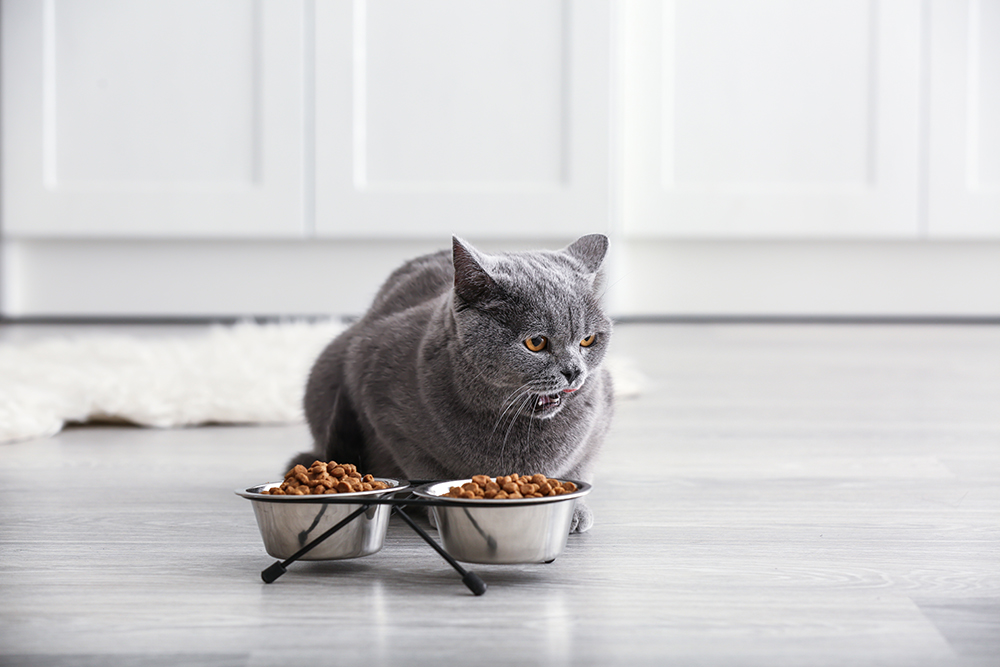
Orijen Product Line
Orijen’s cat food and treat lines are surprisingly limited despite the company being around for so long. They carry roughly the same number of cat products as Open Farm, though Orijen carries freeze-dried treats along with their wet and dry foods.
Orijen’s ingredients are biologically appropriate and include whole prey ingredients, meaning they are ingredients your feline would naturally eat in the wild.
Dry Food
The Orijen dry food product line comes in:
- Kitten Formula
- Original Cat
- Guardian 8 Formula
- Six Fish
- Regional Red
- Tundra
- Fit & Trim
The first five ingredients of each recipe consist of either fresh or raw protein sources, making it particularly high in protein. Orijen’s recipe lines are biologically appropriate, and the ingredients match what cats are evolved to consume.
Some dry recipes are also considered WholePrey and include meat, organs, and bones. Other ingredients include lentils, chickpeas, green peas, pumpkin, pears, apples, and probiotics. Overall, the blend of ingredients makes for excellent cat nutrition.
Wet Food
Orijen’s wet cat food line comes in:
- Chicken & Salmon Kitten
- Original
- Tuna/Salmon/Beef
- Regional Red
- Duck & Chicken
The wet food line carries even more protein sources than the dry food line. For example, the first eleven ingredients in the Regional Red are fresh or raw meat and meat products. You won’t find any fruits or veggies here, and the wet food products are made entirely of meats and added vitamins.
Freeze-Dried Treats
Finally, the freeze-dried treat line consists of:
- Original, Regional Red
- Six Fish
- Grass-Fed Lamb
- Tundra
These, of course, have the fewest ingredients of all the product lines and are made from 99% meat and meat products. This makes the treat line incredibly high in protein. However, some treats have a high-fat content, so you’ll want to be careful not to overfeed your pet.

Price
Cost is always a consideration when purchasing cat food. Open Farm and Orijen are reasonably comparable regarding the price, despite Open Farm’s use of ethically sourced, sustainable ingredients. Prices for both brands vary, depending on where you buy your cat food.
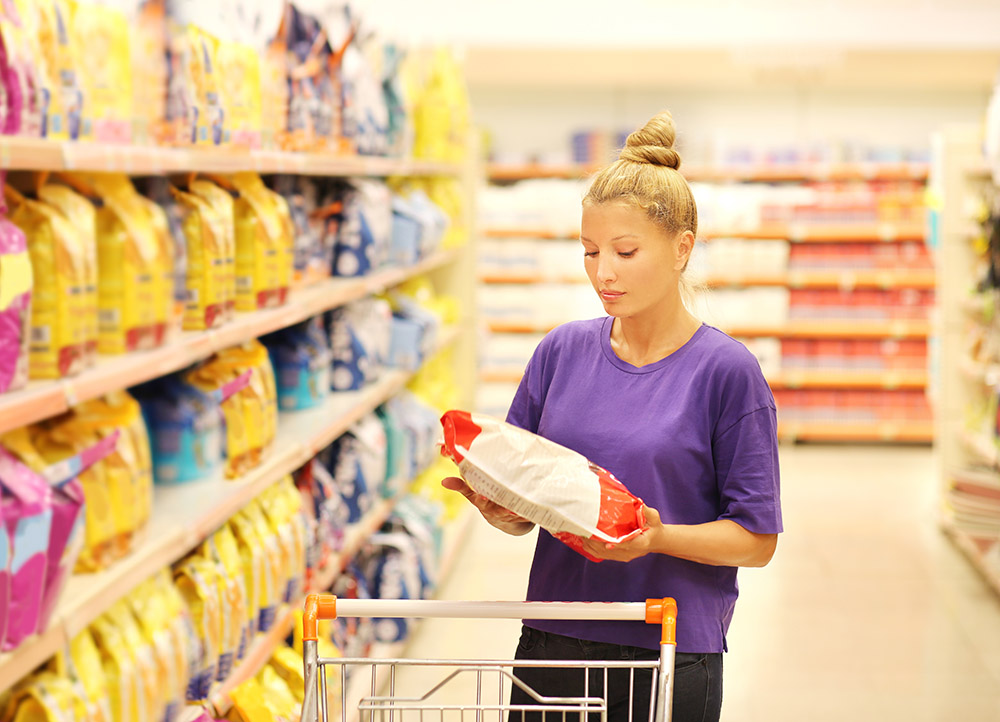
Open Farm
Open Farm’s wet cat food seems a bit pricey at first glance, but considering it’s a 5.5-ounce bag instead of a 3-ounce can, you’re getting a bit more bang for your buck. Their dry food line is comparable in price to other mid-range brands, while their bone broths and supplements are on the pricier side. However, with the quality of the ingredients and the transparency on where they come from, the cost of Open Farm seems reasonable.
Orijen
Orijen’s dry food line runs along the same price range as Open Farm’s, putting them in the mid-range category of cat food brands. Depending on where you buy the wet food, it costs less than Open Farm’s wet food (however, Orijen comes in 3-ounce cans, so you’re also getting less food).
Be careful, though, because packs of wet food are much pricier in some stores. The brand’s freeze-dried treats seem to be a good value, as they are comparable in price to most cat treats but are incredibly high in protein.

Returns & Refunds
Cats don’t always enjoy the food we get them, so when you’re trying out a product for the first time, it’s good to know whether returns are allowed and if you can get a refund. Open Farm and Orijen have different policies regarding refunds and returns.
Open Farm
Open Farm stands behind its products being healthy and delicious, but it still accepts returns as long as they are within 15 days of the purchase date. To return a product purchased via their site, you’ll need to email or call their customer service to get instructions and a mailing address you can return to.
Once they’ve received the returned product, the company will refund your money or exchange it for another product if you prefer. However, refunds don’t include shipping, only the cost of the actual product.
Orijen
Orijen doesn’t have a return policy for cat food since you can’t buy it directly from their website. You’ll need to check out the return and refund policy of the store where you purchased your cat food. Whether that’s Chewy, Walmart, Petco, or elsewhere, ensure you know whether products can be returned and how to return them before buying.

Customer Service
You should always be able to contact a company’s customer service when needed. Below is a look at how consumers rated Open Farm and Orijen’s customer service and how to reach out to them.
Open Farm
Open Farm offers three ways to get in contact with them. You can call or live chat Monday through Friday from 9 AM to 7 PM EST. Or you can send an email and get a response within 48 hours.
According to the Better Business Bureau, there have only been a couple of complaints about the ability to get in touch with customer service and receive refunds promptly. However, these complaints were adequately resolved, so overall, Open Farm’s customer service seems quite excellent.
Orijen
Orijen only provides two ways to contact them: through a contact form on their site or by calling. Calls are accepted Monday-Friday from 7:30 AM–4 PM MST. There’s no information on how quickly the company responds to the contact form.
While some general complaints about the brand were found, we found no complaints about the quality of the customer service. It seems that people who called got through to customer service reps quickly and had their questions answered satisfactorily.

Head-to-Head Turkey & Chicken Dry Food: Open Farm vs Orijen
The Open Farm Homestead and Orijen Original dry foods contain comparable main ingredients, including turkey, chicken, and fish. The Open Farm Homestead dry food contains real meat and fish meal as the first four ingredients, followed by a host of veggies and fruits (some of which are non-GMO).
Cranberries help ward off the risk of infection in the urinary tract, and prebiotics are included for healthier digestion. It also provides your pet with 37% guaranteed crude protein, 18% crude fat, and 470 calories per cup. The Orijen Original dry food contains real meat and fish, as well as meat products such as liver as the first seven ingredients, followed by primarily peas and lentils, with a handful of fruits and veggies closer to the end of the ingredient list.
It, too, contains cranberries that help lower the risk of urinary tract infections and guarantee 40% crude protein, 20% fat, and 515 calories per cup.
Our Verdict:
The two foods are very close, but Open Farm wins out by just a hair since it contains a similar amount of protein as Orijen but with fewer calories.
Head-to-Head Chicken & Salmon Wet Food: Open Farm vs Orijen
Both brands offer wet food containing chicken and salmon, though one is geared towards kittens while the other is for cats of all ages. Open Farm’s chicken and salmon wet food is human-grade, putting it ahead of Orijen almost immediately. It’s also full of tasty ingredients besides chicken and salmon, including lentils and chicory root. It gives your cat a guaranteed 8% minimum of crude protein, 6% crude fat, and 138 calories a pouch.
Orijen’s version is made almost entirely of meat, meat products, and bone broth (other than a bit of egg) but has plenty of added vitamins to meet your kitten’s nutritional needs. It provides your kitty with more crude protein than Open Farm with 12%, but about the same amount of crude fat with 7%. It also only has 100 calories a can (though it contains about 2.5 oz less food than the Open Farm wet food).
Our Verdict:
Open Farms is the winner because of the quality of the ingredients and the amount of food in each bag.
Head-to-Head Fish Recipe: Open Farm vs Orijen
These two products are a bit different since Open Farm’s formula has less fish than the Orijen food, but they are comparable. Open Farm’s dry food contains real whitefish as the first ingredient, with whitefish meal and herring meal being the next two.
It also has the mix of lentils, beans, fruits, and veggies found in other Open Farm recipes (though this recipe contains fewer fruits and veggies than the ones listed above). It guarantees your feline 37% crude protein, 18% crude fat, and 470 calories a cup.
In contrast, Orijen’s food’s first nine ingredients are either whole fish or fish meal, including mackerel, herring, and monkfish. It also contains a good mix of beans and lentils, with a dash of fruits and veggies. Its guaranteed analysis for your pet is 40% crude protein, 20% crude fat, and 515 calories per cup.
Our Verdict:
This one is more of a tie. Both foods are almost equal in protein, fat, and calories (though Open Farms contains fewer calories). But Orijen wins out by having more whole fish in its recipe.

Overall Brand Reputation
We’ve covered a lot thus far, but there’s still more! Here’s a quick rundown on how Open Farm and Orijen compare regarding taste, price, reviews, and quality.
Taste
- Edge: Open Farm
Open Farm comes out ahead when it comes to taste. We saw several people comment that Orijen used to taste better when it was made in Canada, but the recipe quality went down a bit when it started being manufactured in Kentucky. Cats just seemed to be bigger fans of the original Orijen recipes. We didn’t see many complaints about Open Farm, however.
Price
- Edge: Tie
Overall, Open Farm and Orijen have similar prices. Open Farm wins out just a bit when it comes to its wet food line, as more food is provided in a serving. But Orijen’s treat line is more affordable than Open Farm’s bone broths and supplements. So, the result is a tie.
Customer Reviews
- Edge: Open Farm
Open Farm is the winner again. Though plenty of owners and their cats adore Orijen’s food, there were complaints about the recipes not being as good now that the Canadian versions are no longer available to those in the U.S.
However, several customers raved about Open Farm’s products, commenting that their pets had more energy and shinier coats. They also loved the ingredients used and the traceability of those ingredients.
Quality of Ingredients
- Edge: Open Farm
While both cat food products have good ingredients, Open Farm’s ingredients definitely come out ahead regarding quality. From being sustainable and ethically sourced to using human-grade ingredients in their wet food line, this brand’s ingredients are high-quality.

Conclusion
Open Farm and Orijen are somewhat comparable brands, but Open Farm comes out with a slight edge due to their high-quality ingredients. However, if you’re looking for higher protein content in your pet’s diet or for your cat to eat more as nature intended, you’ll likely prefer Orijen.
However, if you’re concerned about where the food is sourced or how environmentally it is, you’ll prefer Open Farm. Both brands are in the same price range and have product lines with a limited number of recipes, so it will come down to what kind of ingredients you want your cat to have.
- See also: Open Farm vs Fromm Cat Food: Comparison
Contents
- A Quick Comparison
- Brief History of Open Farm
- Brief History of Orijen
- Open Farm Manufacturing
- Orijen Manufacturing
- Open Farm Product Line
- Orijen Product Line
- Price
- Returns & Refunds
- Customer Service
- Head-to-Head Turkey & Chicken Dry Food: Open Farm vs Orijen
- Head-to-Head Chicken & Salmon Wet Food: Open Farm vs Orijen
- Head-to-Head Fish Recipe: Open Farm vs Orijen
- Overall Brand Reputation
- Conclusion

